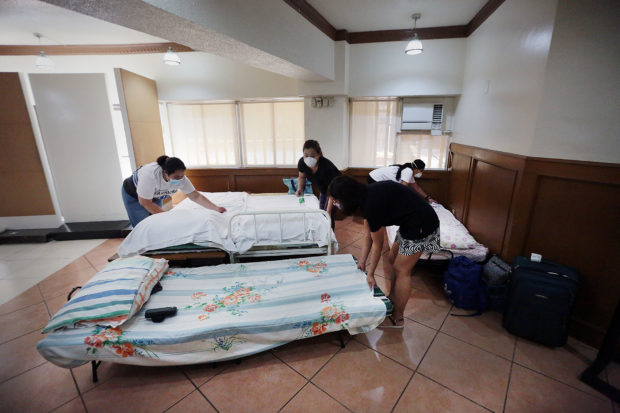
TEMPORARY QUARTERS The Immaculate Heart of Mary Parish in Quezon City has opened its doors to nurses from nearby hospitals who are facing discrimination in their communities or challenges in going to work because of the lack of transportation. —GRIG C. MONTEGRANDE
The Immaculate Heart of Mary Parish in Diliman, Quezon City, stands near several government hospitals that are leading the fight against the new coronavirus disease (COVID-19).
So when some of the front-liners knocked on the parish doors, its response was to welcome them with open arms.
Claretian priest Rev. Fr. Educ Apungan of the Immaculate Heart of Mary Parish has converted the church’s rooms into temporary quarters for health workers from East Avenue Medical Center (EAMC), National Kidney and Transplant Institute (NKTI), Philippine Heart Center (PHC) and Lung Center of the Philippines (LCP).
Most of them have been facing discrimination in their communities, as well as logistical challenges in going to work because of the public transport ban for the duration of the Luzon-wide lockdown.
“They’re at the front line [of the coronavirus battle] because they have the knowledge and capability to do so,” Apungan said. “But the moment our front-liners lose hope and give up, we’re doomed. So as a sign of gratitude, we welcome them and provide them with shelter.”
He started the project on April 7 with two rooms for seven nurses from PHC.
“Then I got calls that more nurses needed accommodation as well. The problem, however, was that I could provide the facilities but I didn’t have that much resources,” he said.
VP to the rescue
Help soon came from the Office of the Vice President, which donated 50 mattresses and other supplies for the front-liners. Then came other donations from the government and private groups.
Now the parish has seven fully air-conditioned rooms for up to 35 people, complete with mattresses, bedding and free food.
The seven PHC nurses have since been joined by 20 more from LCP, seven from NKTI and one from EAMC.
Apungan, however, said that right now, they were accepting only nurses who were not directly handling COVID-19 patients. But all of those staying at the parish were also at risk of being exposed to the virus in their workplaces, he added.
As the parish responded to the needs of health workers, Apungan said they also had to address another dilemma: the urban poor communities in the six barangays within the parish that were near these hospitals.
Aside from the possible higher risk of exposure to COVID-19, these communities also needed immediate help for their daily sustenance.
Distant relief operations
So the priest developed a system for “distant relief operations” to support small businesses in poor villages, including Central District, Old Capitol Site and San Vicente.
“Even with the lockdown, markets inside communities remain alive. So that means supply was not cut off as well,” Apungan said.
With an initial donation of P100,000 from a doctor, he gave out P500 vouchers to persons with disability (PWDs) and the elderly from poor communities under the parish.
The vouchers could be used to claim around 12 kilos of rice from a local dealer within their respective communities, whom the parish had already contracted for the project.
The goods would be delivered by the dealers to the beneficiaries’ homes in case they could not claim them.
More cash donations
More than 600 vouchers have since been distributed by Apungan as cash donations from other generous souls keep on coming, he said.
Apungan said he had chosen the elderly and PWDs as beneficiaries because as the most vulnerable groups in the community, they often found it difficult to line up for cash and food aid.
With a pool of donations from doctors and other private individuals who understood the plight of communities during the lockdown, Apungan remains committed to his responsibility to help kindness reach the most vulnerable groups.
“Though I cannot directly give them food, this is a form of outright support to them. This can supplement the assistance being given to them by the government,” he said. INQ